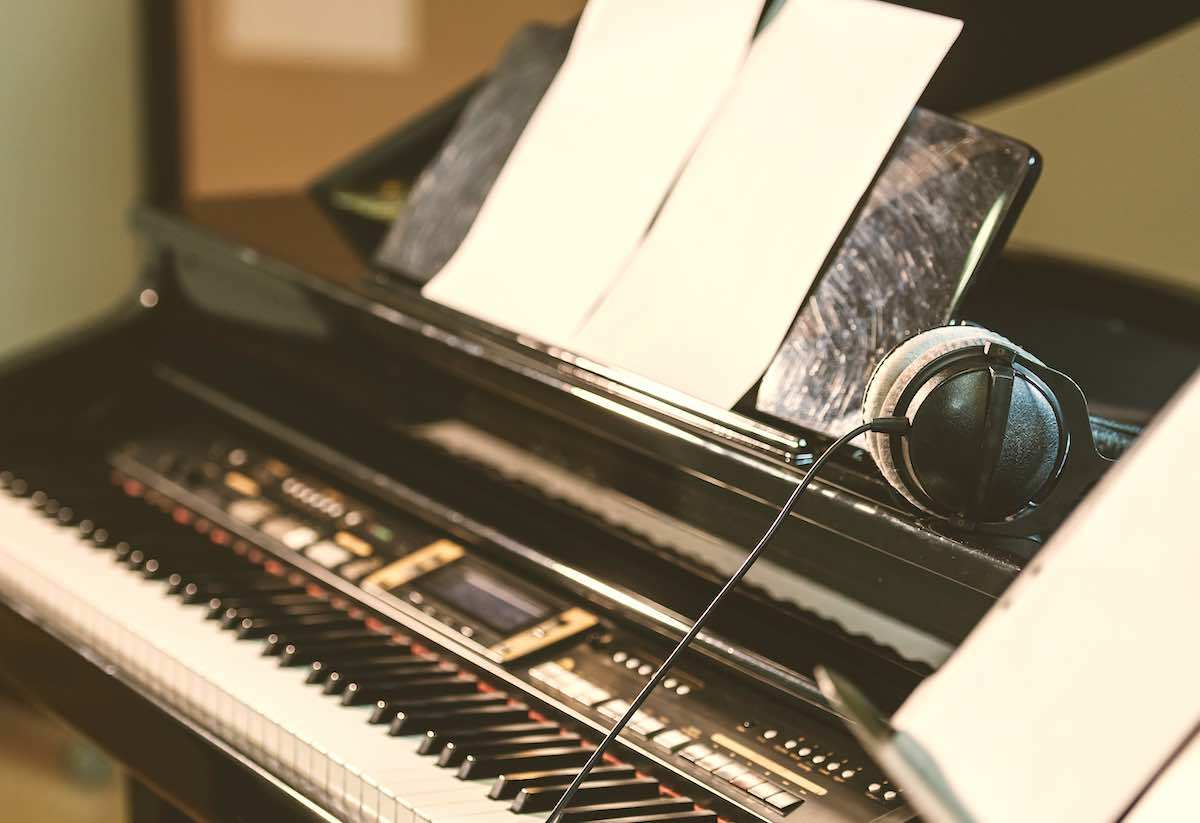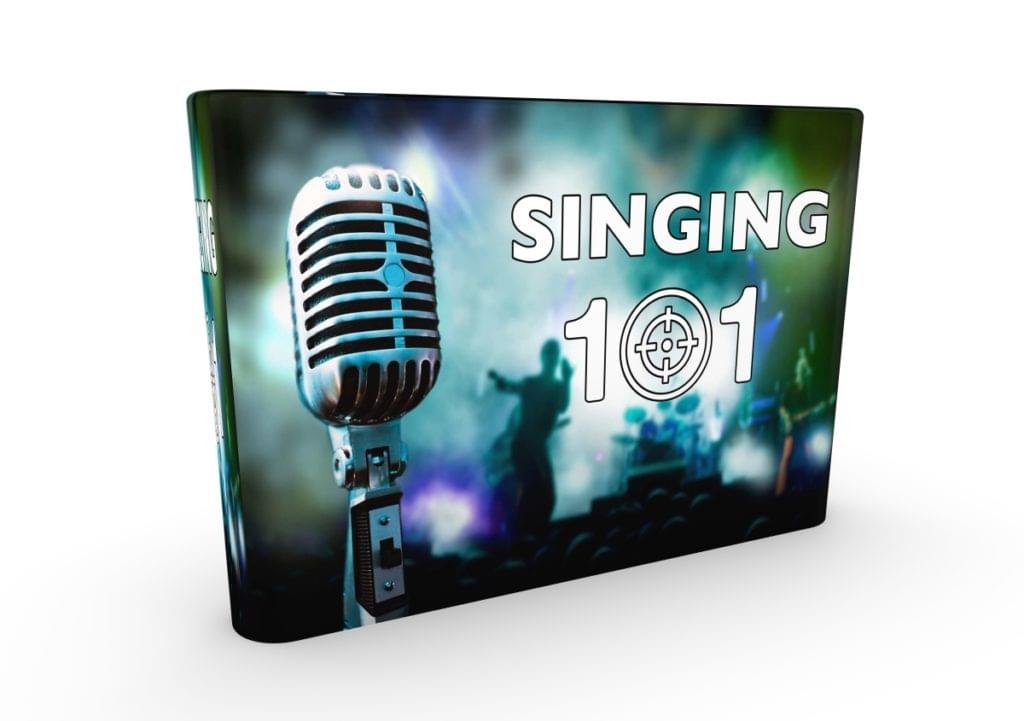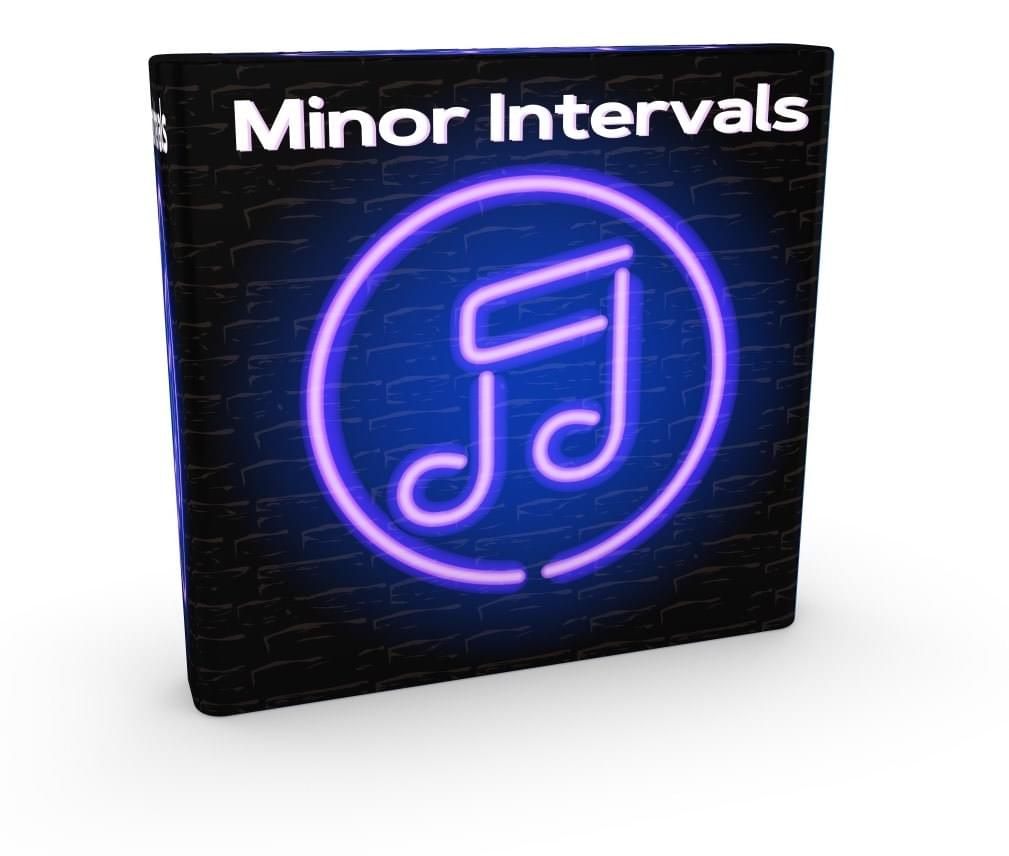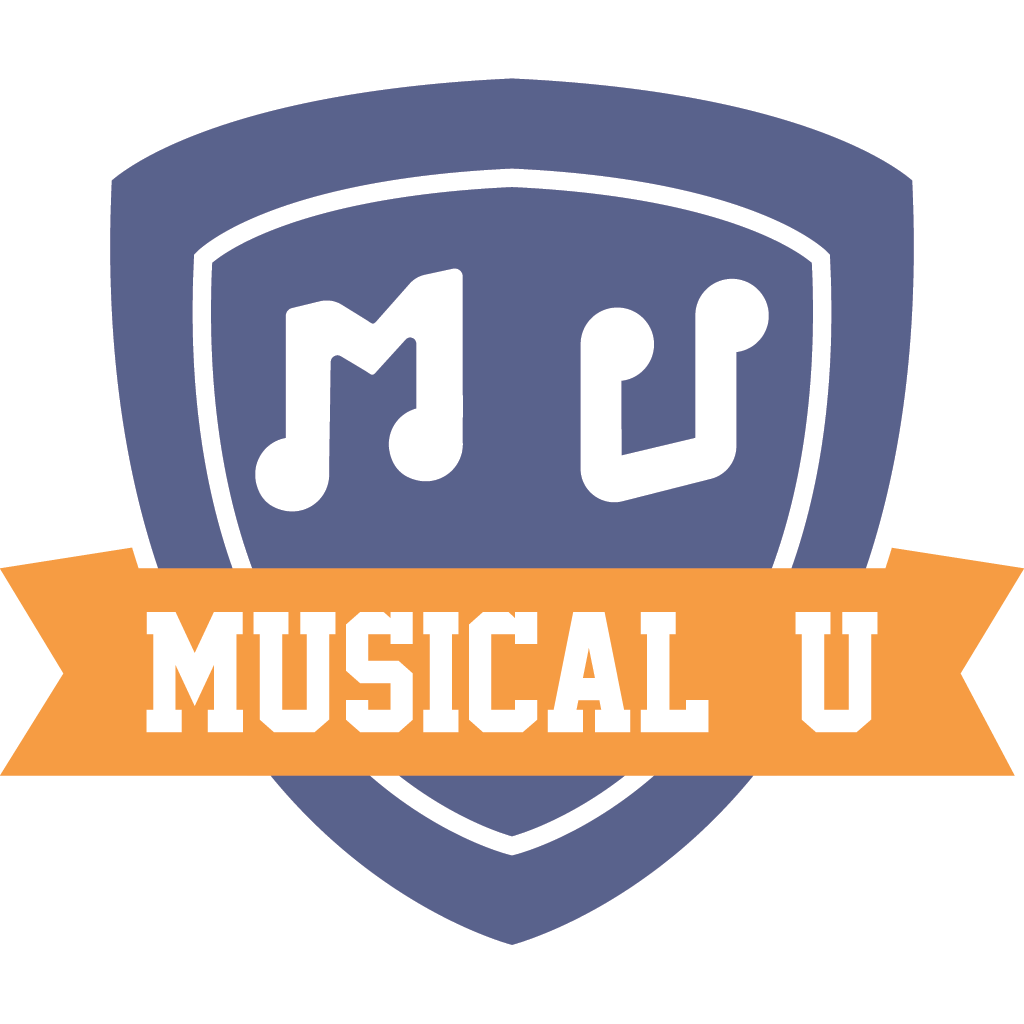
Are You Ready To Discover What YOUR Ears Can Really Do?
Ask any top musician or music educator and they’ll tell you:
A good musical ear is the key to feeling free, confident and creative in music.
A good ear is what lets you play by ear, improvise, jam, write your own music and more.
Whenever we see an incredible musician that seems to be able to handle absolutely any musical situation and holds the audience enthralled with every note - it’s not their fingers that are responsible.
It’s their ears.

That’s why ear training is on the syllabus at every music school and conservatory around the world, and why in a recent survey¹ 99.1% of music teachers said they considered ear training important for musicians.
... but as anyone who has tried to develop their musical ear will tell you: ear training is a hard, long, frustrating process.
What's worse: even those who do put in the time and effort to learn the ear skills typically find they still can't actually use them!
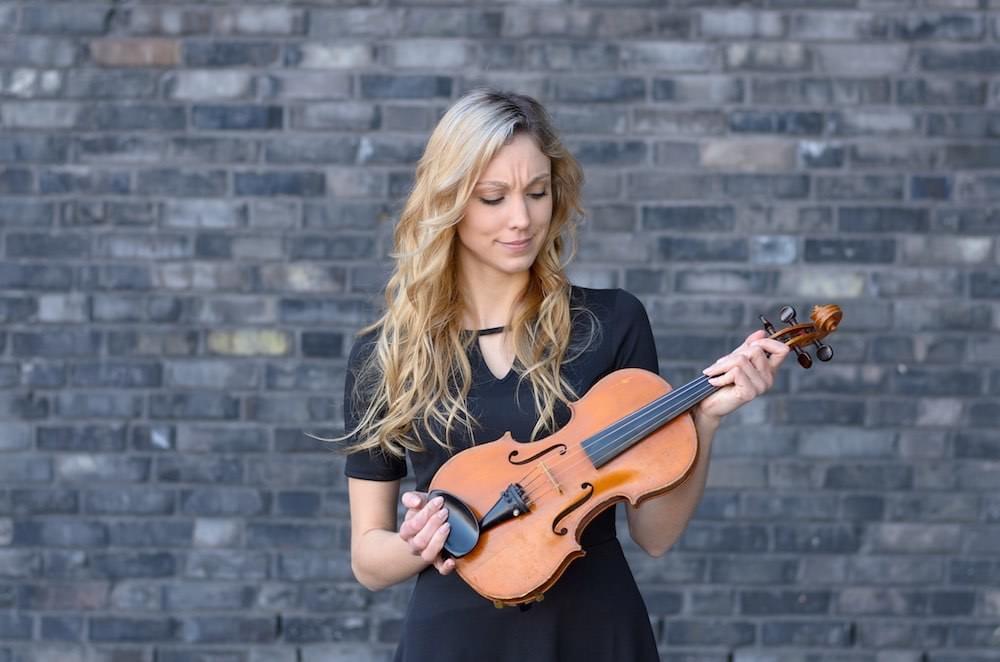
You might have wondered why something so essential is so incredibly hard for the average music learner to master...
(Hint: it’s not down to talent or natural ability…)
So what's the real problem?
The problem is that what we call “ear training” these days is actually just a shadow of its true self.
Everybody is paying lip-service to the idea of ear training - but learning and teaching it in a way that actually produces none of the amazing results it’s capable of.
Ever since the time of Beethoven, music education has been focusing more and more on instrument technique and sheet music - and less and less on the expressive, creative, instinctive skills of true musicality.
Accurately reproducing the “great works” of the past (whether that be Bach, Beatles or Beyoncé!) is seen as the highest accomplishment.

And there is great value in instrument technique and repertoire, to be sure.
But that dream which motivates most people to start learning music in the first place?
The dream of just picking up your instrument and playing freely and expressively?
No amount of instrument technique and sheet music will ever get you there.
The result is a system that’s excellent at teaching instrument technique and producing “music-playing robots” - but little else.
Have you ever felt like a music-playing robot?
Ear training is squeezed into a 3-minute “aural skills” section of instrument exams - or it’s a short chapter in a theory textbook.
Even if you seek out dedicated “ear training” books, courses and apps these don’t actually empower you with a true musical ear...
You can finish the book, complete the course, ace the app - and still when you pick up your instrument, you feel just as limited as before.
This widespread “isolated ear training” does teach some recognition skills - but in a slow, boring way, that’s completely disconnected from the music you actually hear and play.
As a result the vast majority of music learners either do no ear training at all, or they do highly-limited “isolated” ear training that delivers little real benefit.
If you’ve been frustrated or disappointed in your natural musical ear...
Or felt let down by the results you’ve got from ear training attempts in the past...
Or you’ve ever felt that feeling of:
I’m not sure I’ll ever be able to play anything without carefully reading or memorising it first”...
And if you've dreamed of feeling like a "natural" in music...
If you've dreamed of being able to just pick up your instrument and play...
to hold an audience enthralled...
to instinctively understand all the music you hear, play and love...
… then don’t miss this new opportunity to get access to all the incredible benefits of ear training WITHOUT the long, painful, struggle we’ve all been misled to believe is required.
Now for the first time music learners can get all the benefits of a highly-trained musical ear in a fraction of the time AND enjoy the process, every step of the way.
It’s time to let go of the old isolated approach which teaches recognition but not real understanding, and leaves learners with limited, abstract skills that they can’t actually use in any practical way.
Integrated Ear Training™️ is the only approach that lets you actually understand what you're hearing AND immediately use it in your real musical life.
Integrated Ear Training™️ has been developed by Musical U, the world’s leading provider of musicality training, after nearly a decade of specialising in developing ear training solutions specifically for the adult music learner.
Rated 4.8 stars out of 5 in public reviews by members, Musical U has a long-proven track record in providing solutions that maximise effectiveness and enjoyment for the learner.

“A gem for folks who want to get more musical.”
- Puja V.

“It feels like I am getting one-to-one tutoring.”
– Liam S.
If you've struggled with ear training in the past (or you haven't even tried because it just seemed too hard or advanced) it's not your fault.
Musical U has proven with thousands upon thousands of regular, everyday hobbyist musicians that anybody can learn these skills and develop a powerful musical ear.
There is no special talent or natural musical ability required.
And it's never too late.
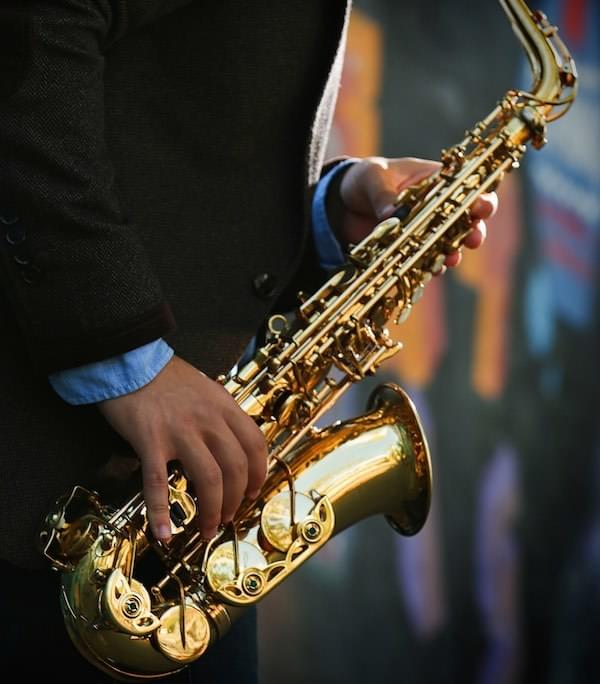
Side note: It’s actually even better than that... The surprising fact is that if you’ve been learning an instrument for a few years you already have a much better ear than you realise, just through what you brain has been passively absorbing.
But until you put some frameworks and specifics on those nascent abilities they remain dormant and you can’t actually benefit from them. With a small amount of ear training you can harness all that passive work you’ve already done and improve more quickly than you imagine.)
Now for the first time you can get access to the world’s most effective ear training method in a program designed for beginners and returning ear-trainers alike:
Ear Training For Beginners combines Integrated Ear Training™️ with Musical U’s renowned dedication to student success: unlimited personal support and guidance, direct from an expert team.

Thank you so much to you and all the team for creating this amazing place called Musical U. I have only been with you a couple of weeks and I am absolutely loving it. I feel like I’ve snuck in the back door of the most supportive conservatoire in the world.”
- Dave A.
With this course there’s no risk you’ll get stuck, be bored or confused, or struggle without reward.
In just 10 days you’ll have a firm grip on the most essential ear skills and be able to actually get benefit from them throughout your musical life.
Secure Checkout. Prices in US Dollars. 100% Satisfaction Money-Back Guarantee.

The Power Of Ear Training
Have you ever wished you could hear a melody - and then immediately play it on your instrument, or write down the notes?
Have you heard an interesting chord progression and thought “I wish I knew what made it sound like that”?
Or maybe you’ve dreamed of being the kind of musician who can just sit in and jam with any band with no prior preparation or anxiety about playing the wrong notes.
Having a good “ear for music” is what provides all these seemingly-magical skills, and more.

It’s been conclusively proven² that although natural abilities do vary, there is no special “gift” or “talent” required to learn these skills.
And even if your focus is on learning and playing songs from notation, ear training is the key to playing with a level of expression and musicality that moves the listener.
In fact it’s universally agreed among experts: ear training is essential for musicians of all types and all levels.

Music Colleges And Conservatories
Every single music college and conservatory around the world (including Berklee, Juilliard and London’s Royal College of Music), as well as all the major exam boards for instruments (including ABRSM, Trinity, RCM, AMEB and Rockschool) include ear training as a standard part of their syllabus.

Top-Level Musicians
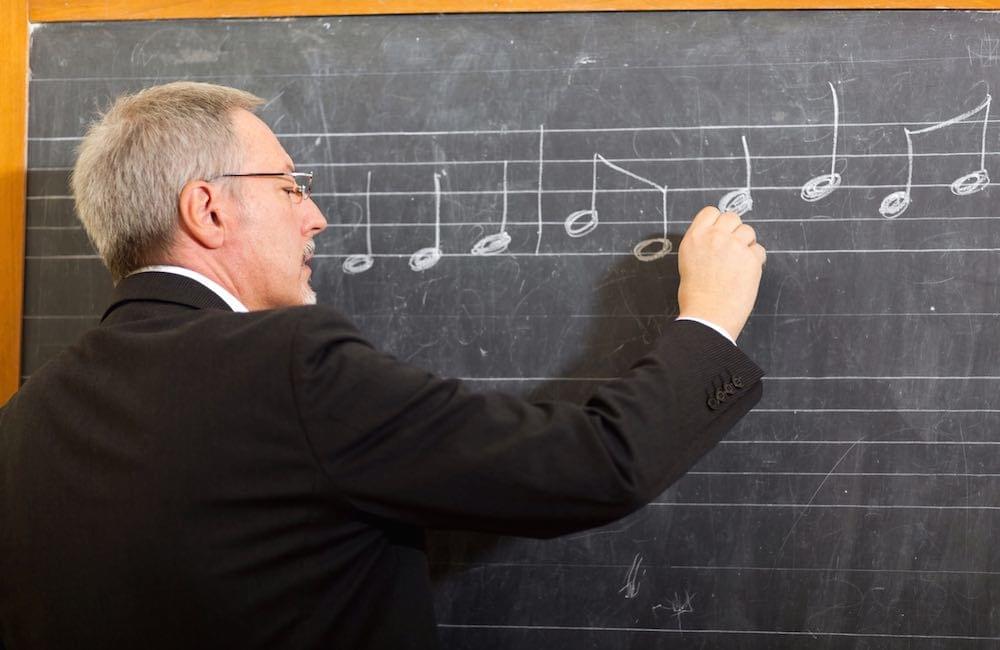
Music Teachers
If there’s one group of experts who are constantly needing to answer the question of “What is most important to focus on, for success in music learning?” it’s music teachers.
In a recent survey³ 99.1% of music teachers from a variety of backgrounds reported that they consider ear training important for musicians and 86% of them included ear training in their own teaching.
Ear training delivers a wide range of benefits including:
- Recognise notes by ear
- More accurate sense of being in tune
- Identify types of chords by ear (major, minor, seventh chords, etc.)
-
Recognise common chord progressions (e.g. I-IV-V, ii-V-I, etc.)
-
Transcribe (write down) what you hear in notation or tab
- Play by ear whatever you hear
- Write and arrange your own music based on imagination, not rules
- Improvise freely and creatively (escape from rule-based “improv by numbers”)
-
Better sense of rhythm
-
Identify intervals by ear
- Identify scale degrees using numbers or solfege
- Improved musical memory
- Understanding what works and doesn’t, musically - and why
-
Collaborate easily with other musicians (e.g. bands, orchestras, jam sessions)
-
Bring music theory to life by understanding how all the concepts actually sound
IMPORTANT NOTE: This is NOT exclusively for professionals and it is NOT just for "gifted" musicians or those with a naturally good ear already.
Ear training is what lets ANYONE reach the level of the pros and so-called "naturals".

Finally, after struggling for years! Musical U you can be proud of your system. Thanks so much for your help.”
- Rita H.
Ear training is also not just for instrumentalists.
Singers benefit from improved intonation (tuning), better blending in groups, higher awareness of what the rest of the group (singers or instrumentalists) are playing - and the ability to correctly sight-sing new music directly from notation.
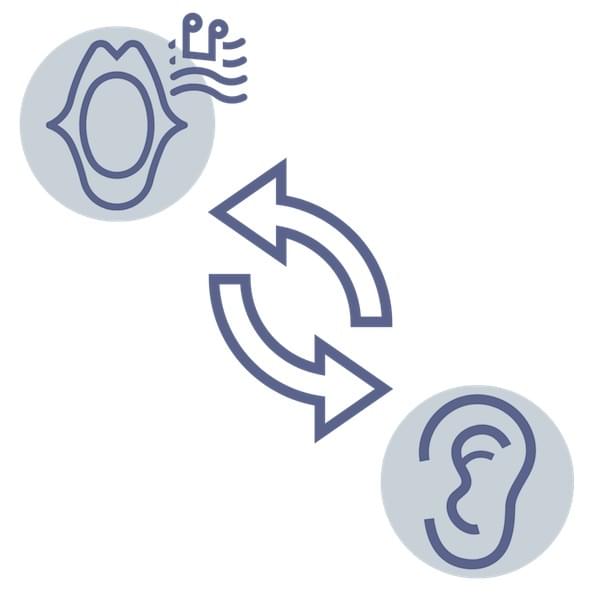
The Ear/Voice Feedback Loop
One of the most powerful ways to train your ear is using your voice - whether you consider yourself a “singer” or not.
There’s a natural and efficient feedback loop between your voice and your ears, so by incorporating singing exercises into ear training it’s possible to rapidly improve both your ears and your voice.
Now at this point you may be wondering...
Let's face it: if you're like the majority of music learners, you aren't enjoying all the benefits discussed above in your musical life.
Why not?
There are three possibilities:
Category ① = You haven't heard of ear training before
or
Category ② = You’ve heard of ear training - but haven't tried it
or
Category ③ = You’ve tried it - but had a bad experience.
Among adult music learners these three categories are roughly the same size: 1/3 haven’t heard of it, 1/3 haven’t tried it and 1/3 have tried it but had a bad experience.
→ If you’re on this page then you aren’t in Category ①!
And you now have a pretty good sense of all that ear training could do for you.
And you now have a pretty good sense of all that ear training could do for you.
→ For those in Category ② (haven’t yet tried ear training) the most common reasons are:
- I have too many other things to learn first
- It’s advanced and I’m not good enough yet
- I don’t have a naturally good ear so it’s not for me
-
I don’t know enough music theory
- I expect it’s expensive
- It’s too late for me because I’m an adult learner
- I don’t know how to start
- Can be part of music learning from day one
- Can be done with any level of instrument skill
- Can be done with no prior knowledge of music theory
-
Can be done successfully, regardless of how good your musical ear is to begin with
- Can be learned as quickly and effectively by adults as by children
- Can be highly affordable
- Can be easy to get started with
Armed with that knowledge, why wouldn’t you give ear training a try?
Well...
The truth is that “ear training” has a pretty bad reputation among musicians despite its awesome power and potential to transform your musicality...
→ In fact, in Category ③ (those who have tried ear training), 9 out of 10 have had a bad experience!⁴
They use words like "difficult", "frustrating", "terrible" (and even a few that can be best summarised as: "&^$@%*!!!")
Why?
Over the years, as ear training has been pushed to the side and turned into a “box to tick” rather than a central component of music learning, it’s become a dry, abstract activity, divorced from the actual musical activities it’s supposed to enable.
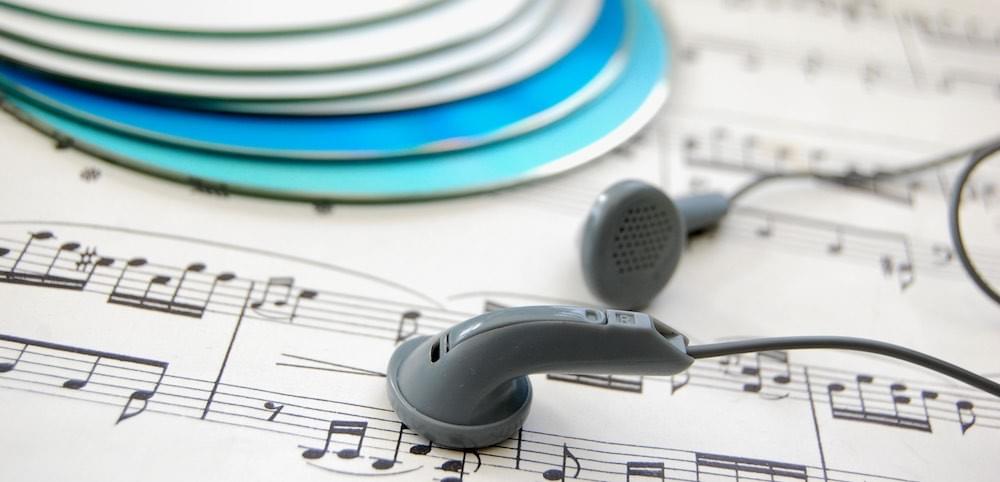
This “isolated” ear training in books, courses, MP3 tracks and interactive apps seems like it’s doing the right thing.
But although the exercises let you feel like you’re making progress, they leave you without any new practical abilities.
The student goes through endless repetitive drills that feel somewhat meaningless - and cause frustration and boredom.
Without any real payoff in their musical lives, it’s no wonder most who try ear training end up giving up, disappointed.

One common example of this:
Intervals.
Have you heard the common advice to start ear training with intervals?
If you’re like the vast majority of music learners who’ve tried ear training, intervals were what you were given to start with...
Intervals are important and can be very useful - but far too many music learners have been led down a path of doing endless interval drills without ever connecting those new skills to anything they actually do in music.
Spending weeks on interval drills regardless of your musical background or goals just does not make sense for the majority of music learners.
Should intervals be included in ear training?
Absolutely.
Do you need to master intervals before moving on or starting to play by ear, improvise, transcribe, etc.?
Absolutely not.
So it’s easy to see why the minority of music learners who do actually try ear training end up thoroughly disappointed - and miss out on enjoying any real benefits in their musical lives.
And now that you see that the problem is isolated ear training, you’re probably already getting a sense of what the solution must be…
It’s not about ditching the drills and exercises - because those are genuinely useful for building the core ear skills.
→ It’s about putting them in a truly musical context. ←
It’s about putting them in a truly musical context.
A context that lets you understand what’s going on in those drills and start using them in practical ways, right from the outset.
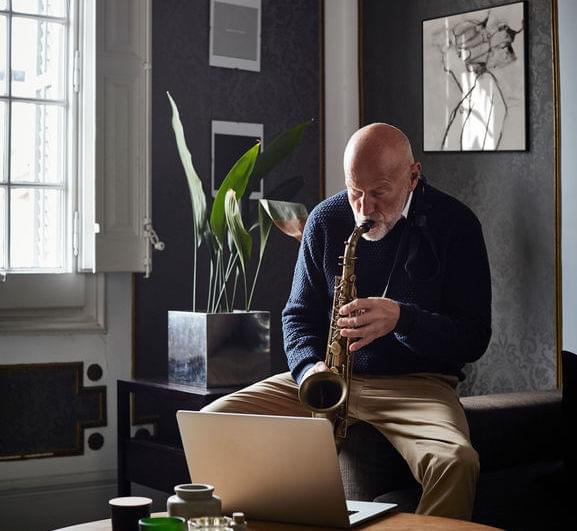


For many years ear training was provided only by music theory specialists or instrument teachers - who inherited this kind of isolated ear training and (understandably) tend to focus on their own topics rather than giving ear training the degree of attention it requires to really pay off.

More recently, a new wave of ear training specialists have emerged - and while these made the core drills more effective and enjoyable, they didn’t really address the problem: ear training being done in isolation.
It’s an approach we call Integrated Ear Training™️.
A NEW APPROACH: INTEGRATED EAR TRAINING™️
If you’ve been learning music for a while, you’ve probably already developed a sense of what we at Musical U call “The Trifecta”: the three essential components to being a musician:
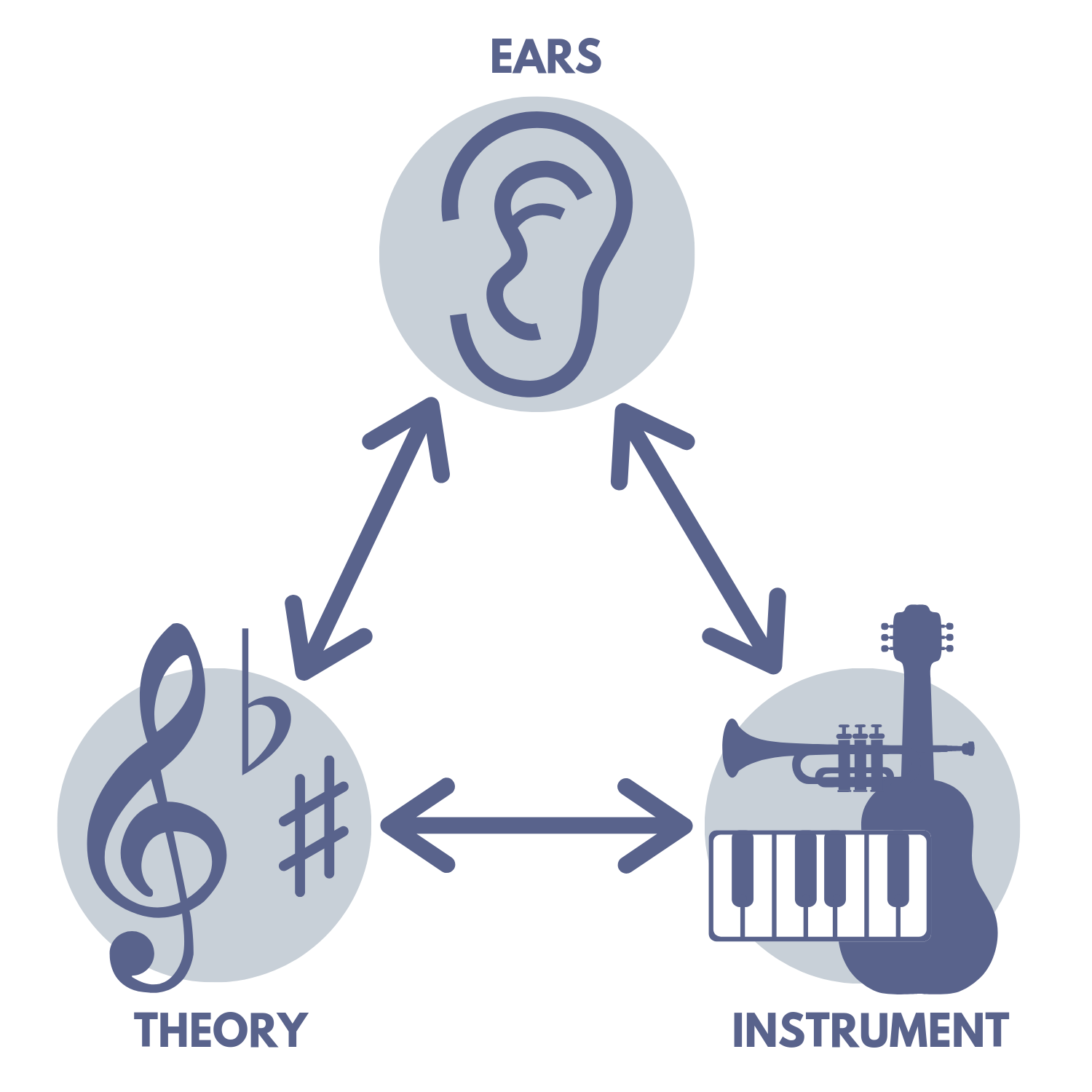
The best musicians balance all three of these, developing their instrument skills, theory understanding, and ear skills in parallel.
Looking at this diagram we can see the two big problems with ear training in the past:
1. Ear training is ignored
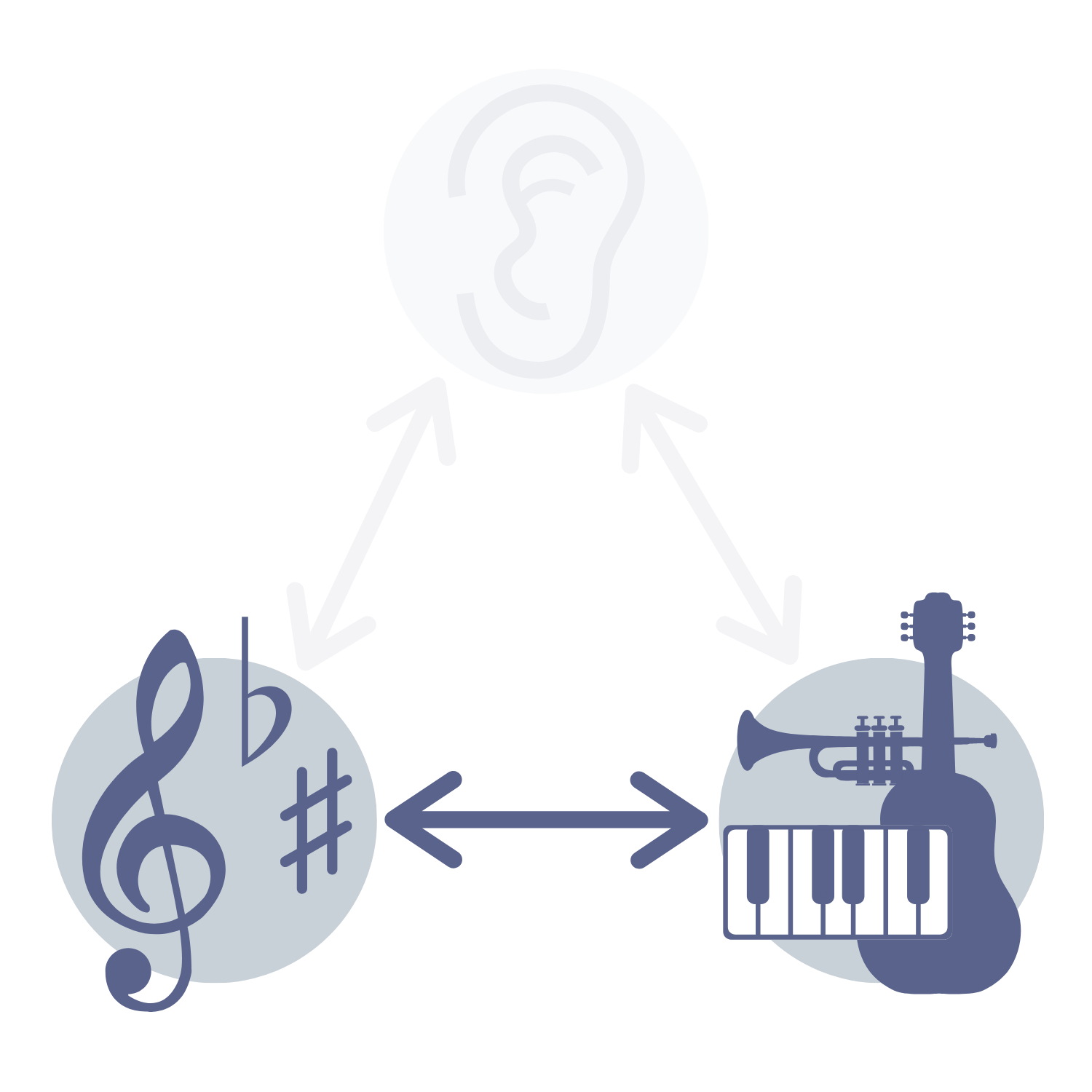
Result: A musician who can play accurately, perhaps with great speed and complexity - but is strictly limited to reading notes from the page or memorising in advance.
2. Ear training is done, but isolated
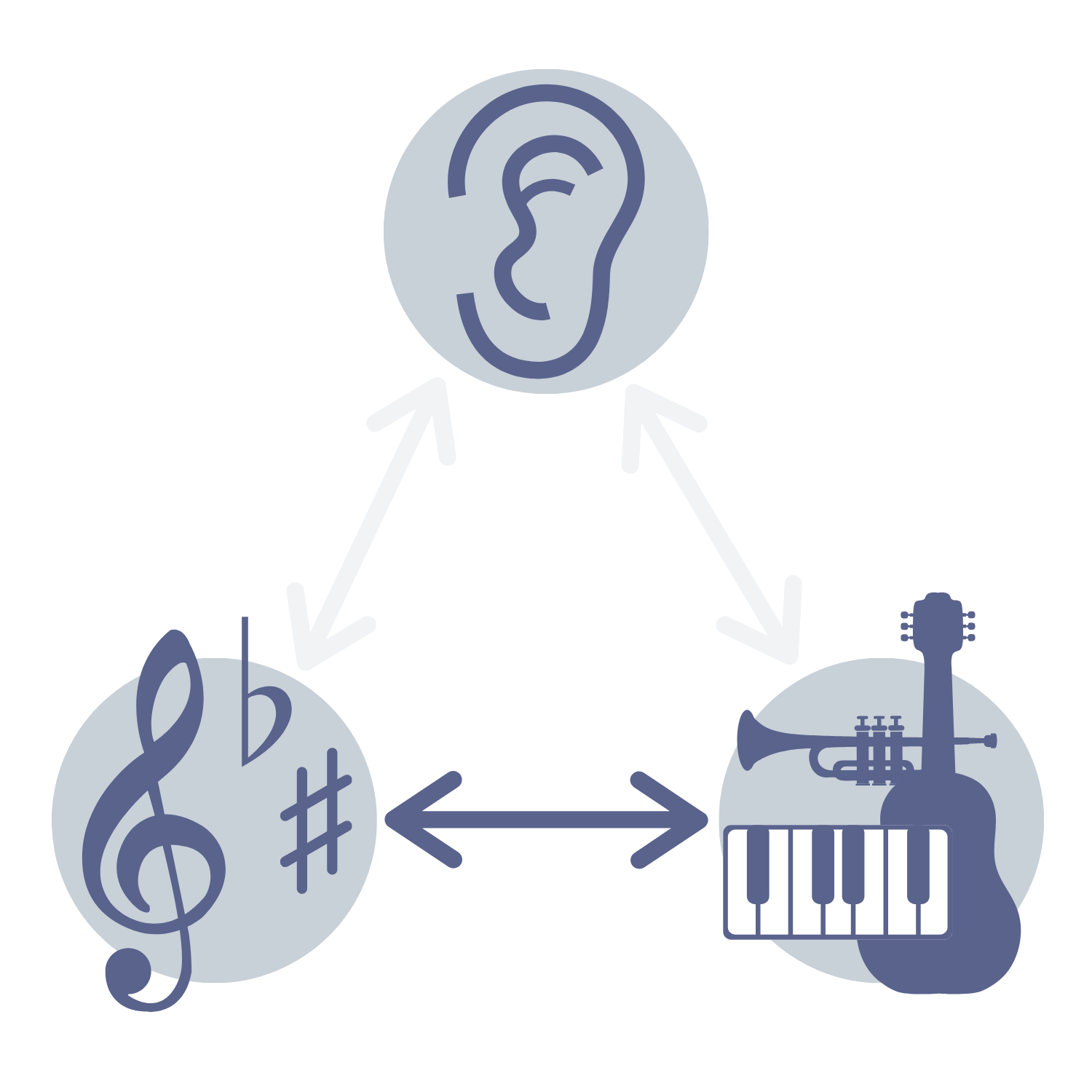
Result: an ear that can pass tests and complete app exercises - but doesn’t actually help in any way in their real musical life.
The same two things happen with music theory: people study it as a separate activity in their music learning, or not at all.
So for most people their music-learning "trifecta" actually looks more like:
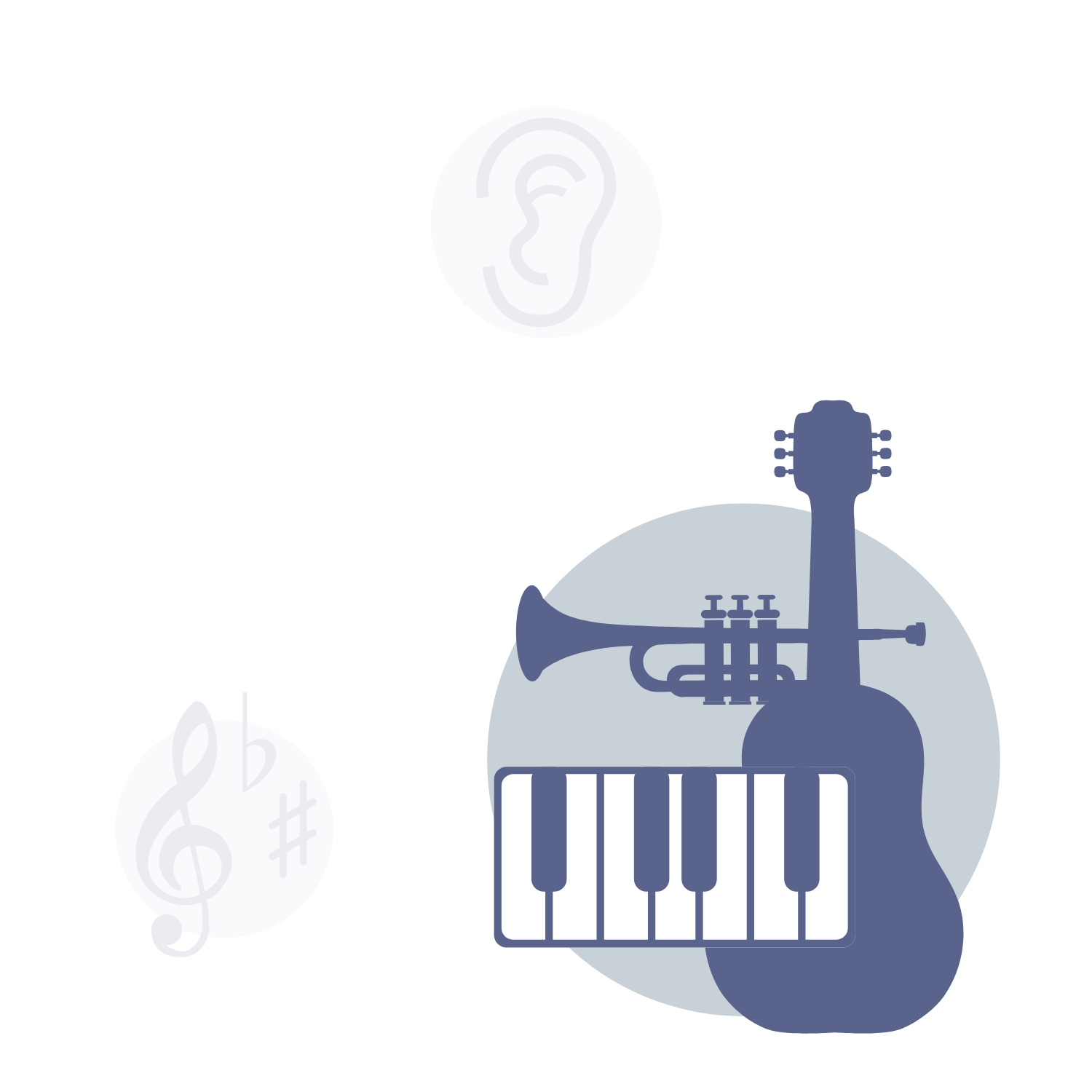
Instead, all three of these essential components of being a musician can (and should) be learned in an integrated way.
And when you do that, it’s a game changer.
That’s why we developed the Integrated Ear Training™️ process where all the ear training you do is related directly to the underlying concepts and the actual usage on your instrument and in real music you hear:
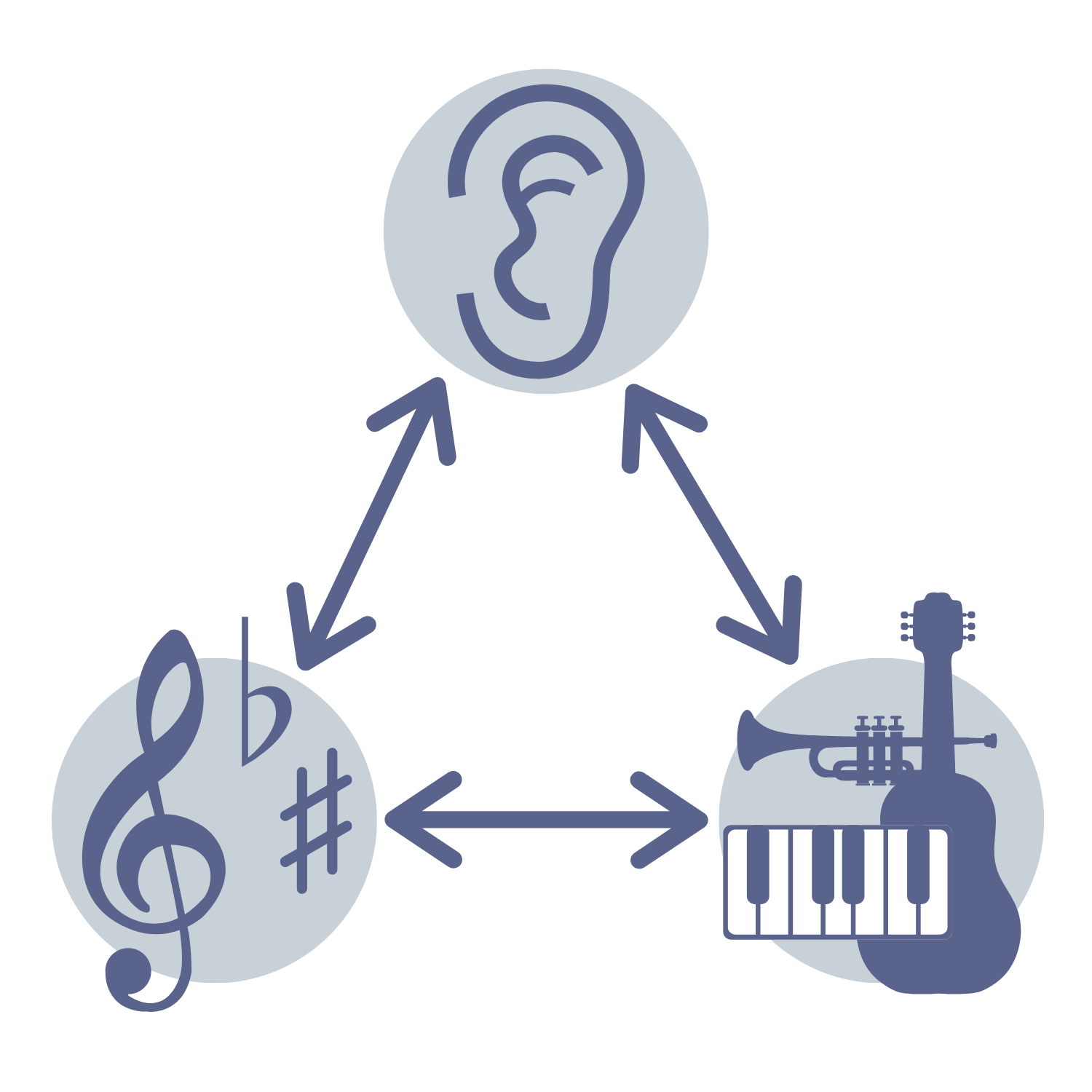
LOREM IPSUM DOLOR SIT
What does Integrated Ear Training™️ actually look like?
We’ve taken the proven LPA ( “Learn, Practice, Apply”) Framework used throughout Musical U’s world leading musicality training and applied it to the design of this unique 10-day ear training program.
Again this isn’t about dropping the proven drills and exercises that develop core listening skills.
But all those exercises and drills represent only the “Practice” stage of the process.
Meaning:
The "Isolated Ear Training" that’s so prevalent has only been providing the middle stage of a 3-stage process!
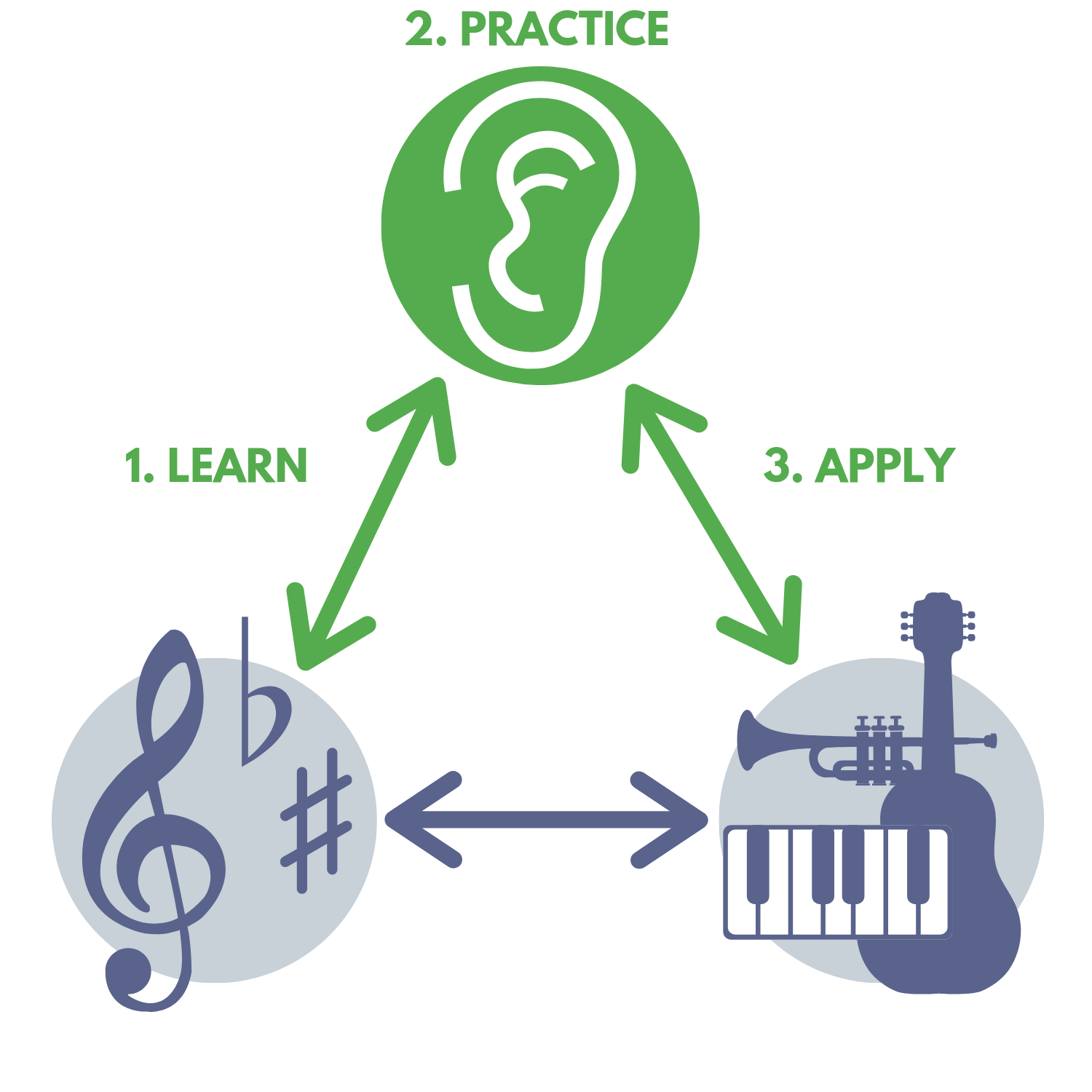
Integrated Ear Training™️ is about filling in two other stages to the ear training process, which makes those core drills really pay off.
Once you experience these other two stages you’ll wonder how anyone ever thought the middle step alone could be effective!
Each day in Ear Training For Beginners you will:
- Learn the essential concepts
- Practice exercises for develop core listening skills
- Apply those new skills to real musical tasks like playing by ear and improvising

The result: An ear that’s built on a solid foundation of theory understanding and can be immediately applied in useful ways throughout your musical life
Musical U Members Say:
Wow! So simple but so profound. I literally felt something in my head click into place!”
- Beth G.
I'm very happy! Early on when I started on Musical U, I made the comment that ear training made me feel awful. I don't feel that way anymore.
- Christine P.
The Essential Connections
As you can see in the “trifecta” above, it’s essential not only to learn instrument technique, music theory and ear skills - but to connect them all too.
Until now, even the most devoted ear training students have studied it in a way that’s almost entirely disconnected from the theory they know and the instrument technique they have.
So even though they are diligently covering all three essential areas, they’re not getting the full benefit of any of them - because the connections aren’t there.
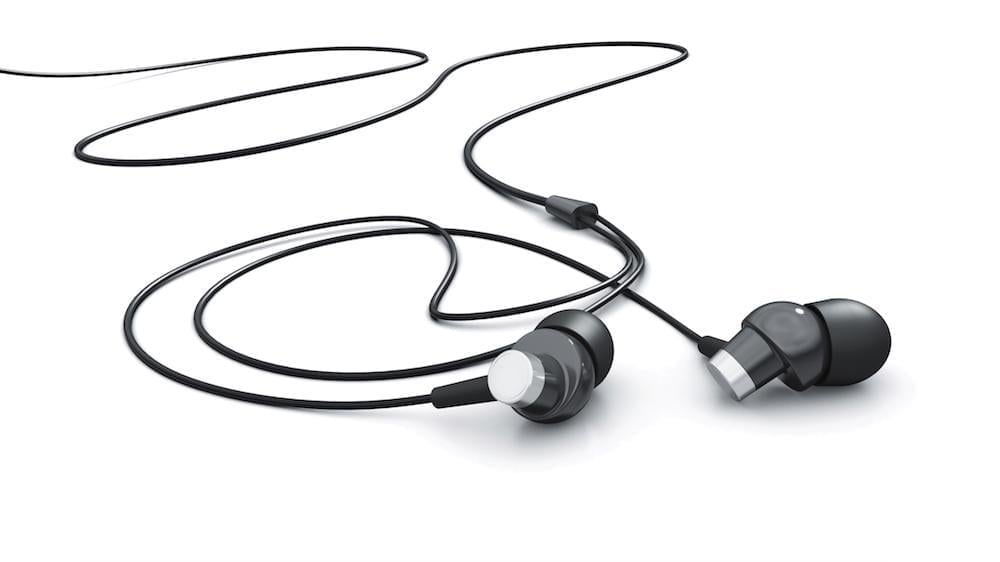
When you focus on only the “Practice” stage of ear training you can get good at the particular app, exercises or drills you’re doing - but you don't truly understand what you’re practicing and you can't actually use it in your real musical life.
It is possible to “add in” those connections after studying each area in isolation - but it’s incredibly difficult.

What truly works is to build those connections while you build the core skills.
Meaning that your ear training includes immersing in the theory concepts, so that the new skills you develop have a “place to live” inside your musical mind. And it includes immediately taking those new skills to your instrument so that they become practical and musically meaningful to you.
- Do ear training without “Learn” - and you’ll be equipping yourself with ungrounded, abstract skills - which might pass tests but will never quite “click” in your mind or relate to your undestanding of music.
- Do ear training without “Apply” - and you can spend unlimited time and energy without getting a single step closer to actually being able to play by ear, improvise, transcribe, write your own music, jam… The actual, practical, rewarding skills will forever remain out of reach.
Secure Checkout. Prices in US Dollars. 100% Satisfaction Money-Back Guarantee.

Again thank you very much indeed and congratulations for the very clear and pleasant pedagogical approach! I really liked it!"
- Gabrielle D.
"I was so focused on the mechanics of playing the right notes and chords in the songs I’ve been learning without really understanding why they fit together. Ear training has definitely an eye-opener!"
- Kris V.
COMPARISON
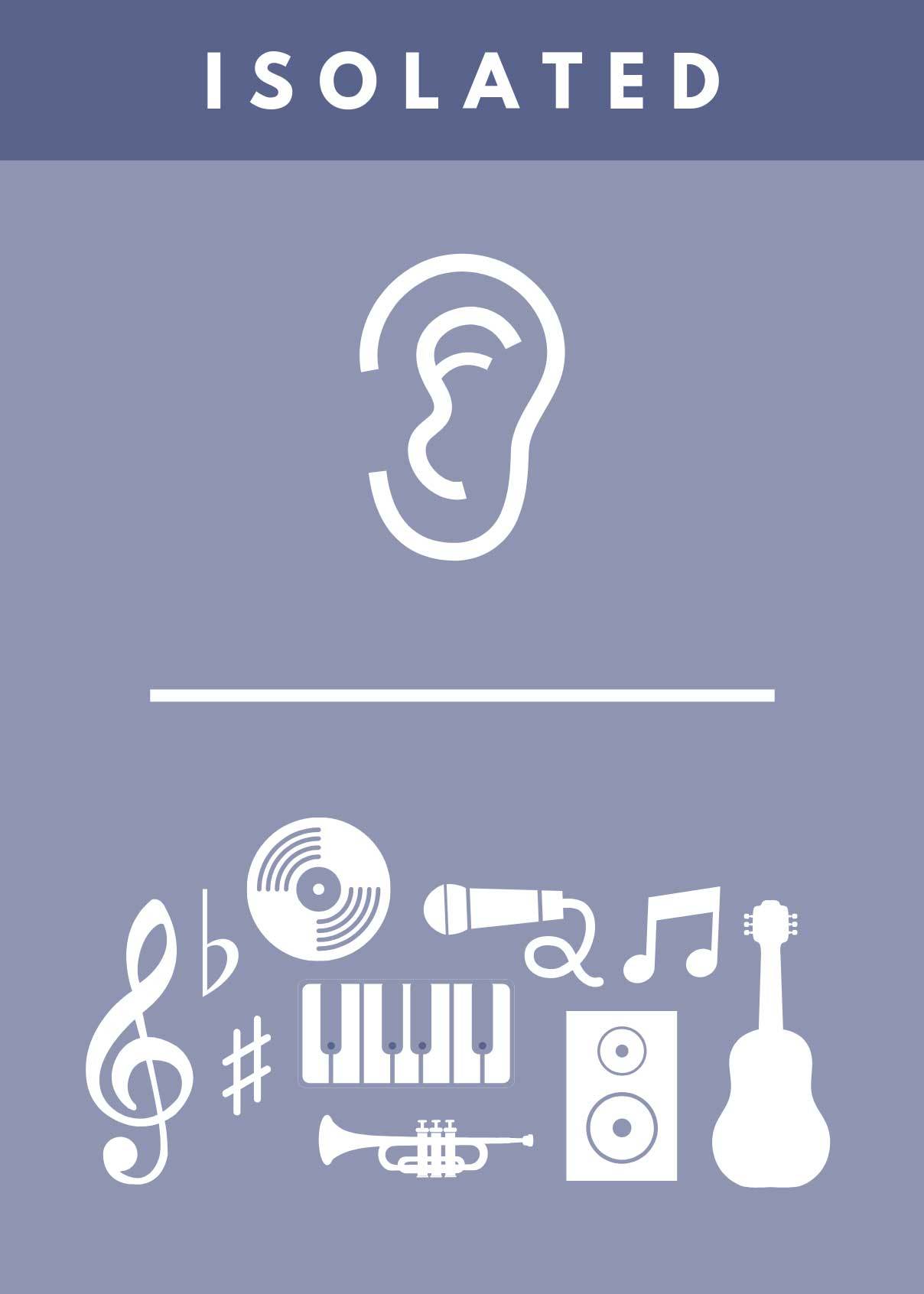
The standard approach used today in books, courses and apps.
- Treats ear skills as a topic to be studied separately
- Covers only the listening skills
- Quickly becomes dull and repetitive
-
Is hard to stay motivated with - because there’s no reward
-
Seems unrelated to your instrument, style and goals
-
Has little impact on your musical life
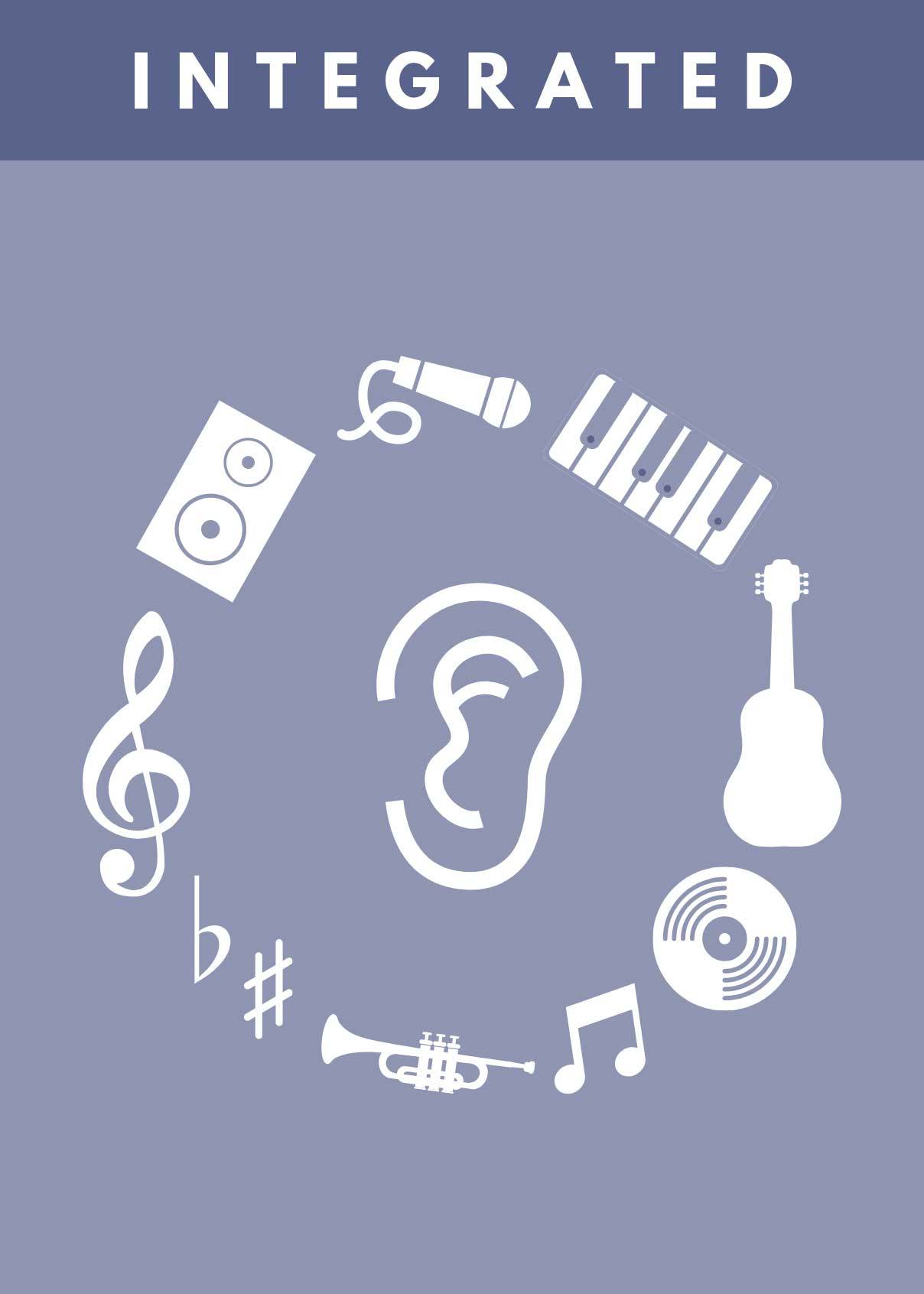
The new approach available in Ear Training For Beginners.
- Places ear training in a musical context
- Relates all listening skills to theory and instrument
- Is musically meaningful throughout
-
Is exciting because you get benefits immediately
-
Is directly connected to your instrument, style and goals
-
Can quickly transform your musical life with new skills and confidence
Get Access To Integrated Ear Training™️ Today, Exclusively In The New Course From Musical U:
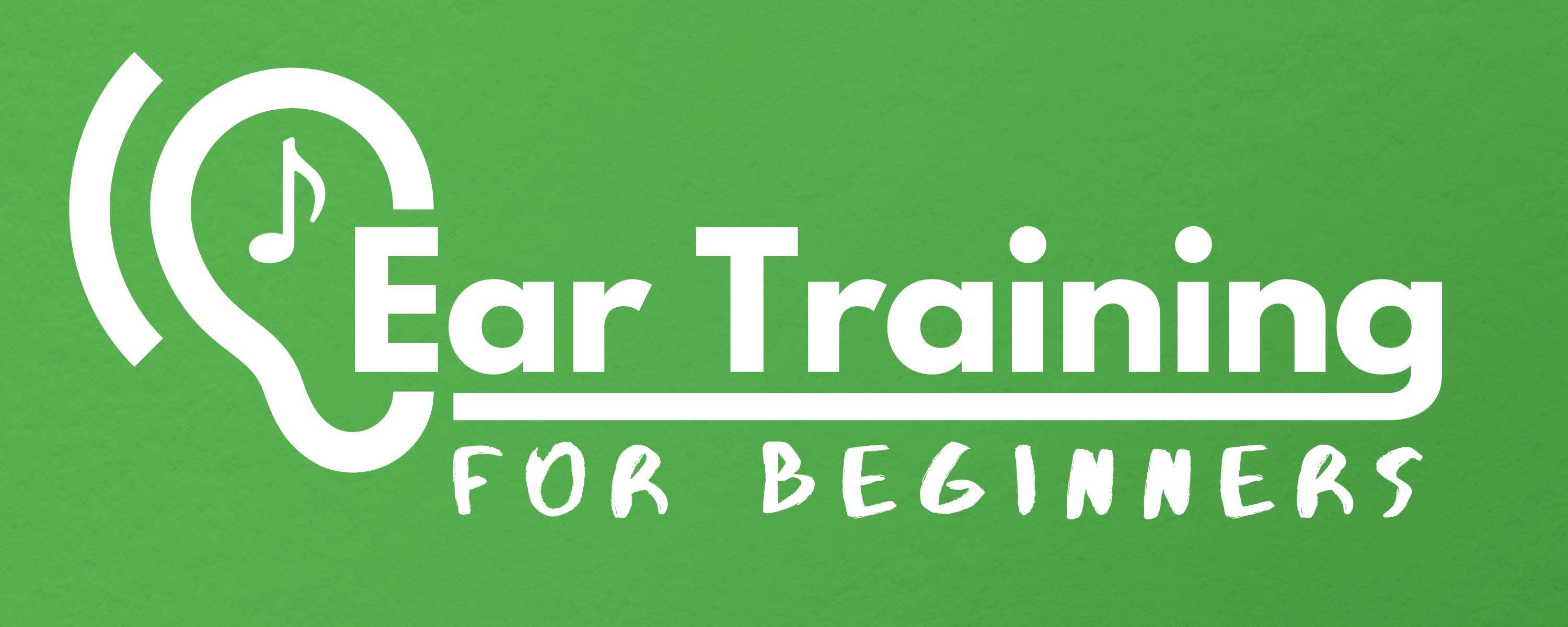
One of our core beliefs at Musical U is that every musician is different.
We all have different backgrounds, interests, abilities and goals.
That’s why Musical U itself is built around a fully flexible and personalised training system.
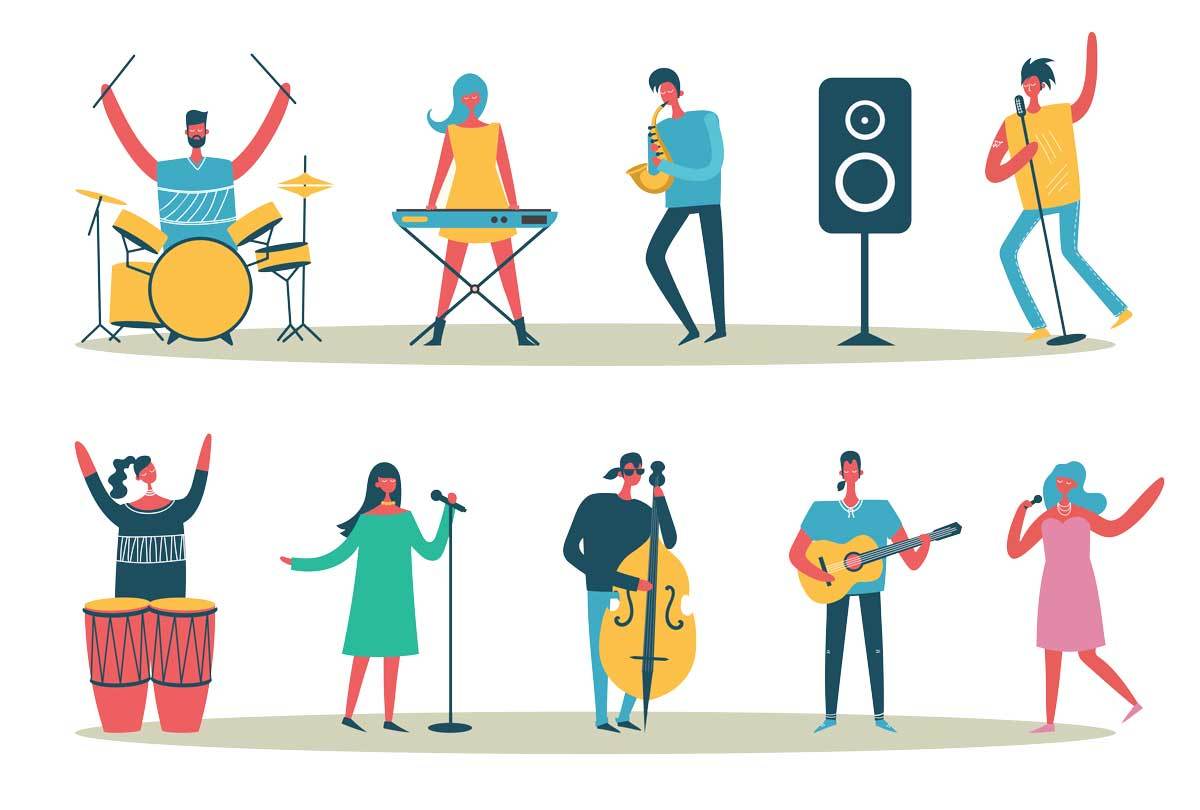
But when you’re at the “beginner” phase, actually a single, clear, straight line course can be a very good thing.
Especially when coupled with personal support and guidance direct from an expert team.
What's Covered In The Course?
Ear Training For Beginners is a 10-day course, built to cover the three most central topics in ear training: intervals, solfa and chords.
At the heart of your musical ear is your sense of pitch, and specifically what’s called relative pitch. This is the ability to recognise one note based on its pitch distance from another note.
Relative pitch is what powers all the exciting skills of musical expression like playing by ear, improvising, jamming, transcribing, writing music and more.

If you’ve ever wished you could hear or imagine music - and then immediately just play it or write it down, relative pitch is the skill you want.
There are two main ways to develop your relative pitch: INTERVALS and SOLFA (also known as “solfege”, “scale degrees” and “the number system”).
Neither is better or worse than the other - both are powerful and useful in their own ways. Many musicians will end up favouring one as their primary method of recognising notes, but the best musicians make use of both.
That’s why Ear Training For Beginners will give you a solid grounding in both relative pitch methods, intervals and solfa.
Intervals
Solfa
Once you can identify individual notes by ear, you will naturally want to apply those melody skills to harmony too. This will let you understand the chords and progressions in the music you hear and play and do exactly the same kinds of activities: playing them by ear, improvising with or over them, writing them down, etc.
Ear Training For Beginners covers the most commonly-used chord progressions, building on your new relative pitch skills to help you recognise them by ear.
Chords
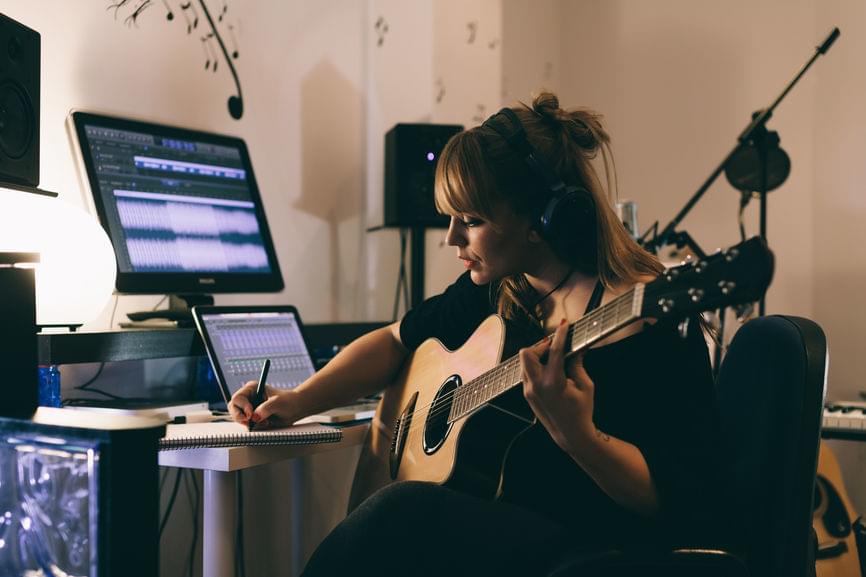
"But what about...?"
If you’ve already explored the world of “ear training” a bit, your brain is probably immediately full of questions like:
- “Does it cover all the intervals?”
- “What about chromatics?”
- “Is minor solfa covered?”
-
“Which chord types and progressions will I learn?”
- “Doesn’t ear training help with rhythm too?”
-
“And what about frequencies and audio topics?”
Understandable!
But here’s the thing: these questions are missing the point…
Here’s why.
Naturally, a 10-day beginners course can’t possibly cover even a fraction of all that ear training can eventually do for you.
With a vast library of training material on hand, it would have been easy for us to simply throw everything into this course and try to satisfy the student by volume alone. But we’re also bringing a decade of experience to the table which lets us see how counter-productive that would be!
So instead of trying to cram it all in and tick every possible box, this course has been built to deliver you the two most important results a beginner can have:
1. You will have a strong foundation of relative pitch, built with firm understanding, core skills and the ability to use that newfound sense in practical ways.
2. You will understand how to do Integrated Ear Training™️, so that every kind of ear training you choose to do in future will deliver vastly more enjoyment and success to you.
Put simply:
We’ve made sure the course is packed with the most valuable ideas, information, exercises and resources to make sure these 10 days with ear training deliver the biggest impact possible for the rest of your musical life.
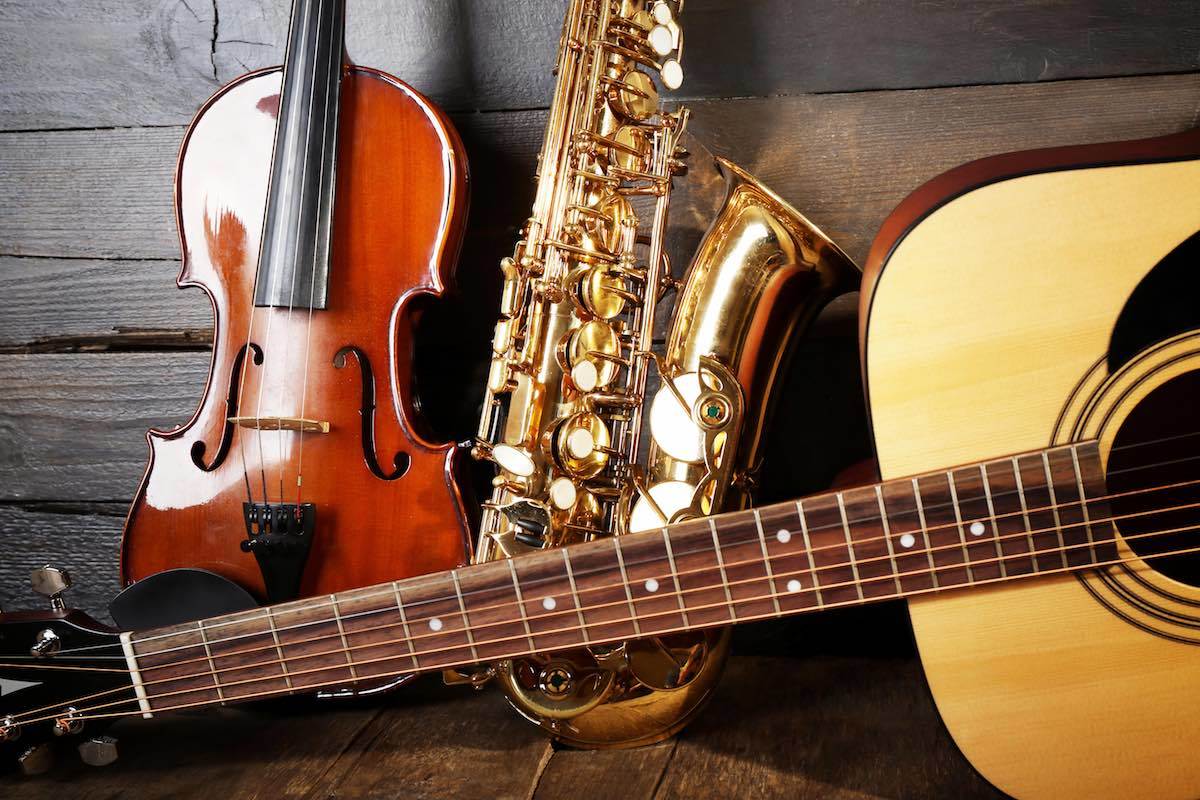
WARNING: This course is not about mastery.

Meaning: you will not be required to master the Day 3 material before moving on to Day 4, and so on.
In fact, even by the end of the course you may not feel you have “mastered” some of the material.
That may sound like a shocking admission for the course provider to make!
But here’s the truth: with most online training the students only ever master the first couple of steps and the majority never make it to the end of the course.

Have you ever started a course and not finished it?
If so, you’re certainly not alone!
And it was likely down to this, the well-meaning but misguided requirement that you must master each step before moving on.

How does the course work?
Ear Training For Beginners is provided online, within Musical U’s private membership website.
The course material is a mix of text, audio and video, accessible to you 24/7 through any web browser (desktops, laptops, smartphones and tablets welcome).
Each day in Ear Training For Beginners you will:
- Learn the essential theory concepts and relate them to the sounds you’ll be hearing.
- Practice core skills which help you recognise and identify musical elements by ear.
- Apply your new understanding and skills to creative, expressive activities on your instrument.
Each of the 10 modules is divided into “Learn”, “Practice” and “Apply” material and so you can also easily adapt this into a 30-day program requiring just 15 minutes per day if you prefer - or any other pacing that’s comfortable for you. The Musical U team will be there to support you however you choose to move through the material.
Every lesson in the course includes a dedicated discussion board for questions and conversation and the Musical U team will be there by your side every day as you move through the course.
At Musical U we specialise in helping adults learn these skills online and take a genuine personal interest in each student’s success. As Faith No More famously put it: We care a lot.


“I've been very impressed by the level of care the team takes for us.”
- Luke B.
A very well put together and very well executed program. Congratulations to the team for the work effort put forth.”
- Sue M.
A unique online learning experience for musicians of all levels. Very responsive support team. Highly recommended!”
- Ellen O.
Secure Checkout. Prices in US Dollars. 100% Satisfaction Money-Back Guarantee.

About the course provider: Musical U
Ear Training For Beginners is brought to you by Musical U, the world’s leading provider of musicality training online.
What’s “musicality”? It’s all the inner skills of music which let you feel free, confident and creative in music. And of course a large part of that comes down to your musical ear.
Musical U was born out of Easy Ear Training, a company founded in 2009 to make ear training fun, easy and effective for adult music learners.
After several years developing innovative ear training solutions, the Musical U membership website was launched to provide a more holistic and supportive ear training experience.
Musical U products and training material have been featured in leading websites and publications worldwide, including:


Our flagship membership program is rated 4.8 out of 5 stars on public Google Reviews.


Christopher Sutton
Founder, Musical U
"We had seen the problem of isolated ear training in painful detail. Despite having the leading apps, ebooks and training albums for ear training and them being highly popular with students, we could see that only covering the “Practice” stage was still leaving people struggling with ear training and missing out on its true potential.
Building Musical U allowed us to start providing “Learn” and “Apply” training modules and supporting students throughout the process so that they could enjoy the real benefits of ear training in a way that perfectly suited their musical life. Since 2015 we've helped thousands of adult music learners using our unique “Learn, Practice, Apply” framework for Integrated Ear Training™️.
Many music learners know they’re ready to dive into the wide world of musicality training and love the all-you-can-eat approach of Musical U membership. But we recognise that others simply want an easy and clear way to get started.
That’s why now, for the first time, we're excited to offer access to this world-class training outside of full Musical U membership, in a 10-day course that is specifically designed for adult beginners."
Leading Music Educators Are Saying:

“The Musical U team is downright amazing. They have a great attitude and are always working hard to ensure their members are in the loop and making progress towards their goals. I'm not aware of any other community out there like it. Highly recommended!”
- David Andrew Wiebe
Music Entrepreneur HQ

“Musical U is one of the best, most devoted resources on the internet for musicians who are serious about growing their musical skills. I am constantly amazed at the depth of insight and the quality of resources that are available."
- Natalie Weber
Music Matters Blog

"The guidance and content found at Musical U is outstanding for those seeking to find their musical voice as well as those who've found it and need support to further their skills and creativity."
- Leila Viss
88 Creative Keys

"Fantastic ideas and inspiring insights into learning, playing and teaching music."
- Glory St. Germain
Ultimate Music Theory

“What makes Musical U a great place to learn music is their atmosphere of caring about their students and really sharing the joy of music. It's a refreshing and welcome resource for all music lovers.”
- David Reed
Improvise For Real

"For those of us willing to seek it out, we now have the ability to invite the best musical instructors from all over the world into our homes to teach us the ideas that can open up the world of music to us. Our friends at Musical U are some of the best of the best!”
- Scott Sharp
Fretboard Toolbox
100%
GUARANTEED

We are so confident that you’ll love this training course and be delighted with the results it provides that we are covering it with a 90-Day 100% Money-Back Guarantee.
Here's Everything You Get When You Buy Ear Training For Beginners Today:

- 10 Ear Training Modules, Covering Intervals, Solfa and Chords
- Integrated Ear Training™️: Learn, Practice And Apply
- Works For Any Instrument
-
Flexible and Convenient Online Access 24/7
-
Unlimited Personal Support and Guidance
Secure Checkout. Prices in US Dollars. 100% Satisfaction Money-Back Guarantee.

Don't Miss This Chance To Get The Musical Ear You've Always Dreamed Of
Up until today, you might have had all kinds of reasons in mind for why you didn't have a "good ear" for music...
"I'm just not a natural..."
"I've never had a good ear..."
"I didn't learn early..."
"I tried ear training and it was too hard..."
"I've tried improving my ear but it didn't work..."
Whatever it is that's been holding you back, it's time to escape the myths and misconceptions and confront the exciting reality:
Anyone can develop a good musical ear
AND
Ear training can be easy, enjoyable... and MUSICAL!

With Integrated Ear Training™️ you can develop a rock-solid instinctive understanding of all the music you hear and play, and there's never been an easier way to get started than with Ear Training For Beginners.
In just 10 days you could have a whole new relationship with your musical ear and have taken some significant strides forwards into playing by ear, improvising and feeling free and creative throughout your musical life.
In fact the ear is so central to musicality it's no exagerration to say that by learning this new approach to ear training you'll find it will pay off in every musical activity you do, for the rest of your life.
At Musical U we pride ourselves on student delight and success, so we will be with you every step of the way to ensure you get the results you came for. And that's no empty promise - we stand by it with a 90-Day 100% Satisfaction Money-Back Guarantee, meaning you really have nothing to lose by giving it a try.
So you have two options in front of you:
OR

2. Unleash your true musical potential with Integrated Ear Training™️
By learning this exciting new approach you'll be able to "balance your trifecta" and unlock all that your musical ear is truly capable of.
Every part of your musical life will be impacted in a positive way as your ear wakes up and you start developing an instinctive feel for how it all works.
Once you experience Integrated Ear Training™️ you'll know without a shadow of a doubt that you too can have an incredible ear for music and become the kind of free, creative, expressive musician that feels like a "natural".
There has never before been such an easy and enjoyable way to get a good ear for music - and never a better time to start than now.
Don't miss out on your true ear for music.
Act now - and discover what your ear can really do!
Secure Checkout. Prices in US Dollars. 100% Satisfaction Money-Back Guarantee.

Frequently-Asked Questions
Musical U Director Christopher Sutton recently answered the top questions about Ear Training For Beginners on a live broadcast!
Watch the replay below, or scroll down for text answers to common questions.
Questions Covered
[17:55] Q: How much time would I need to dedicate to the training in an ideal scenario
[19:40] Q: Is this suitable for teachers?
[21:00] From Members: Q: How does this course differ from a musical u membership? For example if I had a membership would I have access to this course?
[22:30] Q: If I cancel my membership I know I lose access to what I have consumed - is that one of the differences between membership and buying the courses?
[26:00] Demonstration of Integrated Ear Training™️ and how "Learn, Practice, Apply" works
[33:00] How to make the decision. Specifically:
1. Is this course right for me? (my age, my instrument, my skill level, my goals)
2. Can I afford it?
3. Will I be able to follow through / is this the right time
4. Will I really get results?
Secure Checkout. Prices in US Dollars. 100% Satisfaction Money-Back Guarantee.

Q: When does the course begin? Is it flexible?
The course begins after purchase and you'll receive access to one module per day after that for you to go through whenever you're ready.
The course is structured as a 10-day program providing daily training. However you can move through the course at your own pace and will have lifetime access to the materials.
So although the course will run “live” with a set start date, you are free to begin the program whenever you like and proceed at your own pace.
Q: How much time will it take?
We estimate it will take 45-60 minutes to complete each day's module, depending on your prior knowledge, how quickly you go through the material and how long you spend on the exercises.
Don't have an hour a day?
No problem.
We understand that music time can be limited and precious, often scheduled around a busy life!
So the course timing is fully flexible. You can move at your own pace and will have lifetime access to the course.
For example, each module is split into three parts and so you could easily choose to use it as a 30-day course, spending 15-20 minutes per day.
Q: What happens at the end of the course, can I keep the material?
Yes. You’ll have access to the web material even after the "official" 10-day period is over, for as long as you need.
Q: Is this suitable for beginners? Do I need to know music theory?
The course is designed to be 100% accessible to beginners. If you know what a major scale is (and ideally can play one or two on your instrument) you’ll be fine.
Q: What if I get stuck or need help?
At Musical U we specialise in helping adult music-learners succeed with online training materials.
Any time you feel stuck, confused, have a question or need help, our team will be standing by and happy to help.
The first option is to post in the discussions you'll find throughout the course. Our team will be in there every day answering questions and providing any clarification or tips required.
The second option is to contact our team directly if you'd prefer to receive help privately. You can do this by email or using the message system on the site.
Q: Will this work for my instrument? What about singers?
Does your instrument plays notes or chords? Then ear training will work! :)
The course is designed to be accessible and usable with all instruments. Naturally some exercises will lend themselves more to single-note or to chordal instruments - but you will be able to explore all the ways ear training can apply to your instrument (as well as learning about some that may not apply directly but can still enlighten and empower you).
Singers benefit from ear training with improved intonation (tuning), better blending in groups, higher awareness of what the rest of the group (singers or instrumentalists) are playing - and the ability to correctly sight-sing new music directly from notation.
Q: How does this relate to Musical U Membership?
Ear Training For Beginners is an excellent introduction to the kind of training provided inside Musical U membership and all that could be possible for you in musicality training.
- Musical U Membership provides access to a range of training modules (along with community and expert support) for a monthly or annual subscription, to help you develop all the practical inner skills of music such as identifying notes and chords by ear, tightening up your sense of rhythm, playing by ear, improvising, singing in tune and more. It is designed for musicians (including singers) to help them explore the full world of musicality training.
- Ear Training for Beginners is a 10-day course, built to cover the three most central topics in ear training: intervals, solfa and chords. The course will give you a solid grounding in both relative pitch methods, intervals and solfa. It also covers the most commonly-used chord progressions, building on your new relative pitch skills to help you recognise them by ear.
Membership and the course are both provided within the same secure training website so it's easy to upgrade to full membership later if you choose.
If you need advice on whether membership or one of our courses would be more suitable for your particular needs please contact support@musical-u.com or give us a call and we'll be happy to help.
Q: Is this suitable for teachers?
We are always eager to support music teachers in any way we can. With this course we are excited to announce a new program designed to empower music teachers to help their students enjoy more success with ear training (for free). Get in touch by emailing support@musical-u.com if you’d like to know more.
Q: I only have a mobile device, can I still take the course?
Our online training website is compatible with all modern internet devices and web browsers.
As long as you have some type of web browser (e.g. Chrome, Safari, Firefox, Internet Explorer) on your device, you will be able to take the course successfully.
Any other questions?
Have another question? Get in touch!
CUSTOM JAVASCRIPT / HTML
We look forward to hearing from you!


Secure Checkout. Prices in US Dollars. 100% Satisfaction Money-Back Guarantee.

References
1. Musical U Teachers Survey 2019. 329/332 respondents answered “yes” to “Do you consider ear training important for musicians?”.
2. Cambridge University’s “Handbook of Expertise and Expert Performance”, Ericsson et al., 2018 Interview with Professor Anders Ericsson on Musicality Now
3. Musical U Teachers Survey 2019. 329/332 respondents answered “yes” to “Do you consider ear training important for musicians?” and 283/330 respondents answered “yes” to “Is ear training a part of your teaching?” (note: this would likely be higher except that some teachers taking part specialise in subjects or contexts where ear training would not be part of their own teaching, though is studied by their students)
4. Musical U Email Subscriber Survey 2019. 22/164 respondents answered positively when asked "What was your experience of ear training like?"
5. A few examples: https://www.musical-u.com/learn/why-is-ear-training-so-hard/ (2013)

Trusted by Thousand of Musicians Like You Around The World
As seen in:
© Copyright 2019 Musical U, All Rights Reserved
Contact
Email: support@musical-u.com
Telephone: +1 (415) 230 0296 (US) | +44 203 290 2961 (UK)
Telephone: +1 (415) 230 0296 (US) | +44 203 290 2961 (UK)



